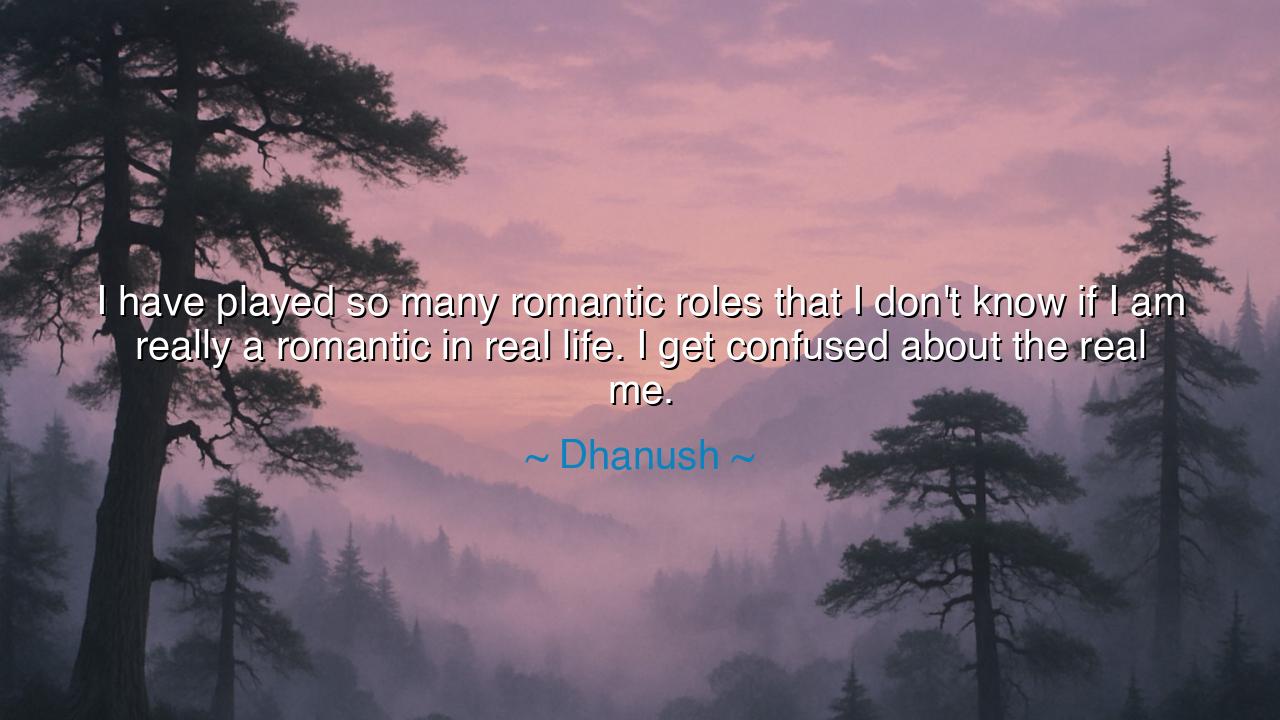
I have played so many romantic roles that I don't know if I am
I have played so many romantic roles that I don't know if I am really a romantic in real life. I get confused about the real me.






The words of Dhanush—“I have played so many romantic roles that I don’t know if I am really a romantic in real life. I get confused about the real me.”—carry with them the weight of an artist’s burden: the blending of self and performance, the uncertainty of where the mask ends and the soul begins. These words are not merely about acting, but about the human condition itself. For do we not all, in some measure, play roles before the world, and sometimes lose sight of who we truly are?
In his reflection, Dhanush unveils the paradox of the actor. To portray romantic roles, he must immerse himself in the gestures, words, and emotions of love, again and again, until they seem second nature. Yet what becomes of the heart when it is clothed so long in the garments of another? Can it still recognize its own naked truth? His confession of confusion is the whisper of one who has gazed too long into mirrors, only to forget which reflection is his own.
This struggle is not new. In the time of the ancients, the philosophers of Greece warned of the power of drama to shape the mind. Plato himself, wary of the stage, feared that repeated imitation could lead the soul away from its essence. He spoke of how the mask, if worn too long, fuses with the face. And so too does Dhanush remind us of this danger: that when the role of the romantic is played so often, the heart begins to question its own authenticity.
History gives us the poignant tale of Sir Laurence Olivier, one of the greatest actors of the modern age. Known for his masterful portrayals of kings and heroes, he confessed in his later years that he sometimes lost sight of who he was apart from the stage. His craft demanded total surrender, but the cost was often a fracturing of the self. Like Dhanush, Olivier experienced the blurring of reality and performance, proving that even the most gifted are not immune to the confusion between role and truth.
Yet hidden within this struggle is also a profound teaching: the difference between image and essence. To play the romantic does not make one a lover; to speak words of passion upon the screen does not ensure they flow from the heart. And so Dhanush’s words call us to examine our own lives. How many of us perform roles—dutiful worker, cheerful friend, obedient child—without pausing to ask: Who am I, when the stage is empty? Who am I, when no eyes are upon me?
The lesson here is to seek self-knowledge beyond performance. Art, work, even daily life may demand masks, but the soul must have moments of solitude where it learns to hear its own voice. To avoid confusion, one must step away from the stage at times, into silence, into reflection, into honesty. For only there can the heart rediscover what is real and what is role, what is eternal and what is temporary.
Practically, this means cultivating stillness: journaling to hear the inner voice, seeking companionship not for performance but for authenticity, and daring to admit when we do not know ourselves fully. Let each person peel back the layers of role and expectation, until they touch the core of their being. For when we know the real me, we can return to the stage of life with clarity, no longer lost in confusion, but rooted in truth.
Thus, Dhanush’s confession is not weakness but wisdom. It is the wisdom of the artist who has glimpsed the danger of living too long in borrowed skin. Let us take his words as a torch, guiding us to remember that beyond all roles lies the soul, and that to find it is the greatest romance of all—the romance of truly knowing oneself.






AAdministratorAdministrator
Welcome, honored guests. Please leave a comment, we will respond soon